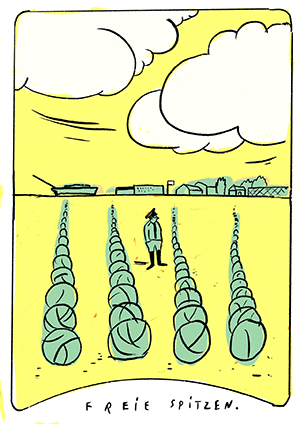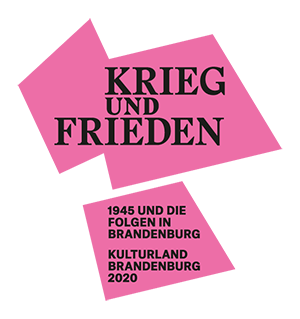


Altranft between war and peace
Or: Putin in Altranft
An exhibition in the Altranft Castle Park with drawings by Johanna Benz based on memories from Altranft
The Second World War and its consequences form an essential part of the landscape history in the Oderbruch: flight, expulsion, search for a home, reconstruction under communist auspices and the collectivization of agriculture, the presence of the Soviet army, etc., all this has inscribed itself in the space and also in the village of Altranft. Some traces are very present, others are increasingly fading and the eyewitnesses who can tell about the time of the new beginning after 1945 are becoming fewer and fewer.
The exhibition, developed under the heading "Putin in Altranft" in conversation with the people of Altranft and designed by the Leipzig artist Johanna Benz, focuses on the presence and influence of the Soviet armed forces in the village. At the end of the war, the Soviet Army found an empty manor house, set up its commandant's office on the old army road and a military training area on the Sonnenburger heights. In his memoirs, an Altranfter tells of Soviet soldiers who rode around the village on small horses, so small that he thought they were circus horses. Although the direct influence of the Soviet troops on the village fades over the years, the development of the village remains closely linked to the new political conditions that were created here after the war: Establishment of an MTS station, foundation of the LPG Clara Zetkin in 1952, transformation of the castle into a culture house, creation of a socialist village. The soldiers were always present in this scenery. A farmer, hunter and sportsman from Altranft claims that Vladimir Putin visited in the seventies. The former field manager of the LPG tells how he had to defend a field against Russian army vehicles with tractors and combine harvesters. Stories like this still abound in Altranft.
The exhibition in the castle park presents these and other events and anecdotes as a pictorial history.
The microscopic view of Altranft, which was first captured by a Polish army unit in 1945 before the Red Army took command, paints a special picture of the end of the war in 1945 that contrasts with the horrific suffering of the last days of the war elsewhere in the Oderbruch.
Opening: 01 August in the castle park
A project within the framework of "WAR and PEACE. 1945 and its consequences in Brandenburg - Kulturland Brandenburg 2020".

A project within the framework of "WAR and PEACE. 1945 and its consequences in Brandenburg - Kulturland Brandenburg 2020".